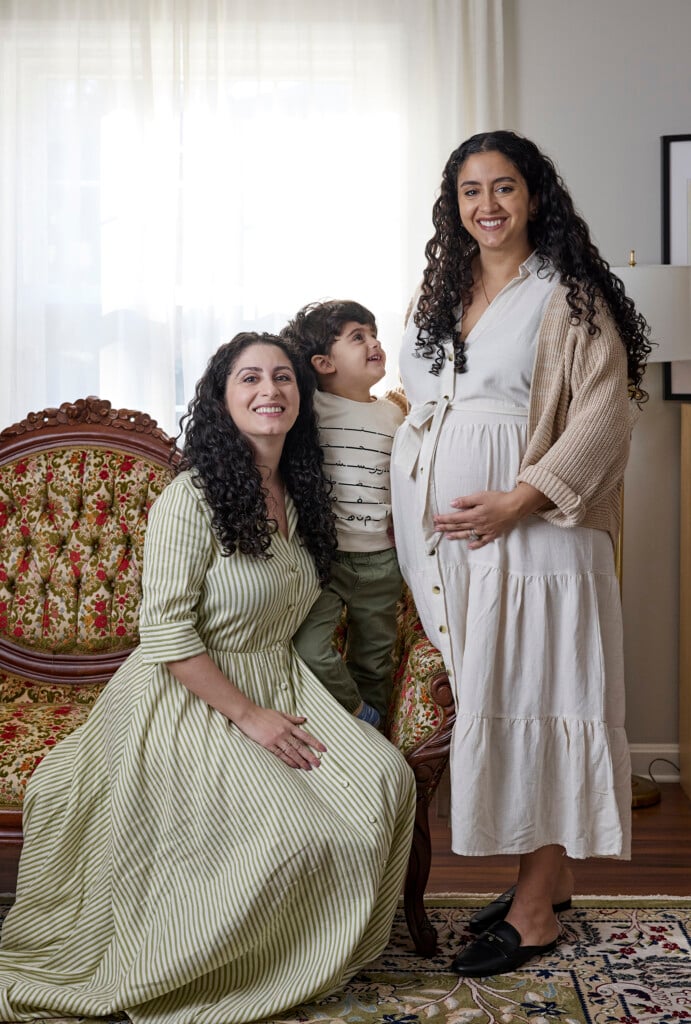STYLE: Little Mishmish
Meet the local sisters who screen-print kids tops that celebrate Arab heritage

Hannah Shaban’s family was gathered at her aunt’s house for a holiday celebration when her then 10-month-old son, Waleed, toddled into the room in his new onesie. The family broke out clapping and singing the classic Arabic nursery rhyme quoted on his little chest: “Everybody has a car, but my grandpa has a donkey,” it goes in English. “He lets us ride behind him and takes us for a walk …” Waleed, who’s “always been a performer,” Hannah says, danced to their singing.
The sisters grew up in Charlotte. But their parents—who immigrated to Charlotte from Lebanon during the country’s 15-year civil war—made sure that their daughters grew up knowing their roots. They sang them Lebanese nursery rhymes, played them Lebanese music, fed them Lebanese meals, read them Lebanese books, and immersed them in the local Lebanese community. The girls learned Arabic alongside English. “My parents really sacrificed a lot to make sure that we stayed connected to our culture,” Hannah says.
In early 2021, both Hannah and her and Zana’s oldest sister, Mona, were pregnant at the same time. Two of their cousins were expecting, too. Zana—a doting aunt and “the best gift-giver,” Hannah says—wanted to buy the new moms a meaningful gift. “I was like, ‘My God, all I want to do is find a onesie that has the Arabic alphabet or something,’” Zana recalls. “Something that was bespoke and unique and would be fun and meaningful for these moms.” She couldn’t find what she was looking for, locally or online.
Hannah, a ceramic sculptor and exhibiting artist, creates the designs and screen-prints the shirts in her home studio, while Zana, an accountant for Ernst & Young, manages the business.
Customers select the size, color of the shirt (all muted, earthy tones), and black or white ink, and Hannah screen-prints each item to order. Garments, available in sizes newborn to 5T, are all 100% cotton, sustainably sourced, and produced by fair-trade—important details to the sisters. They plan to eventually add larger sizes, including some items for adults, at the frequent request of customers.
For now, most of Little Mishmish’s customers are family, friends, and friends of friends.
“Our biggest challenge is growing the business while being sensitive to what’s happening in the Middle East, especially in terms of marketing,” Hannah says, referring to the war between Israel and Palestine. As of November, the global human rights organization Geneva Academy tallied more than 45 ongoing armed conflicts across the Middle East and North Africa. More than 44% of verified deaths in the Israel-Hamas War have been children, the U.N. Human Rights Office reported the same month. Many more have been injured, displaced, held captive, or lost family. And images of suffering children and families have been all over social media feeds since the war began in late 2023. “We want to be sensitive to people seeing their homes and families being affected and destroyed,” Hannah says, “while also seeing advertising with my happy child in America modeling clothing.”
But the war, Zana says, is also all the more reason to do what they’re doing.
TESS ALLEN is the associate editor of Charlotte magazine.














